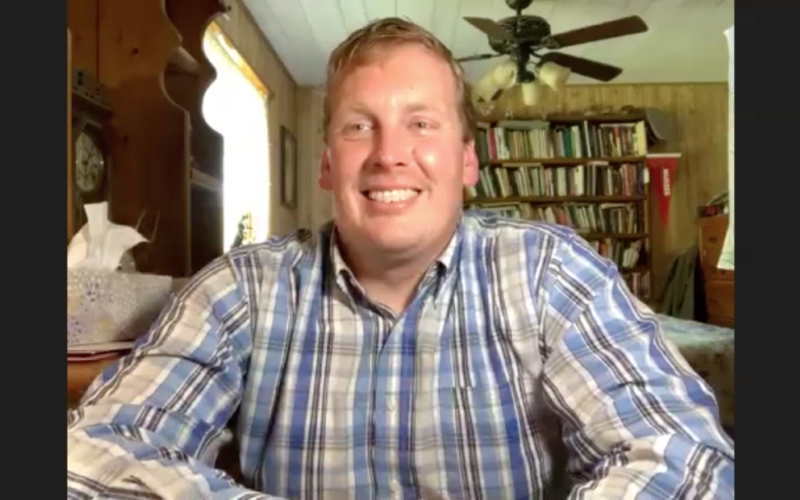Interview with UP State Senator Ed McBroom

In the latest episode of the Rural Insights Podcast, David Haynes interviews Ed McBroom, a Republican member of the Michigan Senate, representing the 38th district in Michigan’s Upper Peninsula. Senator McBroom’s district covers twelve of Michigan’s fifteen UP counties: Alger, Baraga, Delta, Dickinson, Gogebic, Houghton, Iron, Keweenaw, Marquette, Menominee, Ontonagon, and Schoolcraft.
You can read the transcript of the interview below, watch the video interview on our site here, or listen to the audio podcast on our site here.
Remember that you can subscribe to the Rural Insights Podcast on any of the major podcast listening services!
David Haynes:
Greetings everyone. Welcome to Rural Insights. Today, we are delighted that we are going to be talking with for our podcast and our video series, Senator Ed McBroom from Vulcan, Michigan, and he is the Senator from the 38th District. I’m proud to say he’s an alumnus of Northern Michigan University. And also, as he knows, I love the story that he is also one of the active members of the alumni marching band, which always made me very happy when I was President. So Senator, thank you for joining us today. We’re going to cover some issues that maybe aren’t in the press every day, in UP newspapers or radio, some ideas. So the first one I’d like to talk about is you have some very creative legislation about the State Board of Education, which impacts all of our lives in K-12 and high written our children and the voice of trying to increase the rural voice. So I’m going to stop talking and let you talk about that.
Ed McBroom:
Thanks, Dave, it’s really nice to be with you and to get a chance to do this with your viewers and I’m glad we have that special connection with Northern as well as our love for politics and Michigan. So, just to give you a little backstory, I’ve really admired Teddy Roosevelt and feel like during his times in particular, the country was going through some major, major stresses and people who were rioting and demonstrating and let’s burn it down and build it back up. You had a lot of different pushes and Teddy Roosevelt came in and said, “Reform, not destroy. Reform, not revolution.” And you look at as a country matures, the laws that we use that work start to kind of break down and not work as well as they used to. And people don’t get the voice they believe they need to have and things aren’t as fair as they used to be.
Ed McBroom:
And so one of those prime examples is our State Board of Education. We’ve got one of the oldest ones in the entire country, an elected state board and having a State Superintendent, I believe we were the first to do that. And we used to see a board that was pretty diverse from across the state. But over the last several decades, both parties have really come to realize that mostly the people who vote for state board members don’t know them. Most of their votes come through the straight party ticket. And therefore, in order to get your candidate over the hump, you’ve got to find somebody who’s got a lot of their own money and has a lot of their own name, ID, and connections, and can basically get over that hump. And so both parties have pretty much isolated their candidates to Southeast Michigan with the occasional Grand Rapids member.
Ed McBroom:
And I think that’s been a big part of why the Board of Education is not truly able to do the obligations and duties it ought to be. And then that leads to the legislature being far too involved in the nitty gritty, everyday policymaking for Michigan education. And so if we want a state board to once again be doing that job of overseeing the Department of Education, the State Superintendent and driving education policy that works across the state of Michigan, we need to have membership on that board that comes from across the state of Michigan. You might have all the population in one corner, but you actually have a huge amount of schools that aren’t there. Thousands of schools are not in Southeast Michigan. A lot of people over the years say, “Well, let’s select representatives. Let’s divide the state up into districts.”
Ed McBroom:
The problem is if you divide the state up into eight equal population districts, you’re probably still going to end up with at least six, if not seven, from Southeast Michigan, one from the west side and then one for everywhere else. So instead I found that in our constitution prior to 2018, there was a redistricting committee that had actually been set up, it never got activated. But it divided the state up into regions, eight regions. And I took those regions and with slight tweaks here and there to help get some of my Democrat colleagues from Ingham County on board, namely Andy Schor and I worked hard on this, we came up with a map and said, “The parties when they go to their nominating conferences, must on a rotating basis from around the state, nominate their candidates from these particular areas.” So the UP and one member from Detroit would both be on the ticket at the same time from both parties still be elected statewide.
Ed McBroom:
That’s the only way I could really develop this to be a regionalized approach. The way I could get Democrat support because Democrats have controlled the board so long, they’re very nervous about losing that control, and Republicans just want to get rid of the state board, which I think is a foolish move too. So I tried to find that reform rather than just going to one stream or the other, how do we fix this problem? We have a state board. It’s a good idea. How do we tweak it in such a way, so it works the way it’s supposed to again. And so a superintendent from Marquette or a superintendent from Alpena, can call up a state board member who lives somewhere close to them and has some sort of rural experience too, and say, “Could you come to my school and see what’s going on?” Because right now, the guy in Calumet is not getting somebody to drive up from Utica or something like that.
David Haynes:
As I said, it’s a really creative idea. Listening to you now, I’m thinking, might this same process be applied to the Michigan State Supreme Court, since most of the members southeast Michigan and west Michigan, there’s no rural voice. You could use the same district idea that you did, right? That’d be another way of approaching these kinds of state wide boards.
Ed McBroom:
Yeah. It could be, that’s not an issue I’d thought of yet, but I do spend a lot of time thinking about the way government works, the way it’s supposed to work and why it doesn’t work that way anymore, if it used to. And I like to get into just that, let’s make that little tweak, that little change, keep it fair. I’m not looking to run the table for one party or the other, just want to see if we can make these things work the way. And I think a lot of the angst so many people feel these days, is they feel like they’ve got no voice anymore. And you go to the state board and feel like who are these eight people? They’re all from southeast Michigan. What do they know about what’s going on at Norway or Ontonagon?
David Haynes:
It’s really creative. Let me move on to a topic that you also have talked about in the past. And that is public universities, the 15 public universities, 13, actually there’s two well three of the 15 are part of U of M. The Michigan Supreme Court said that since the constitution says they only have to, when they’re in formal meetings, are they required to comply with freedom of information, Open Meetings Act. They regularly meet informal. And when I was president of university, I greatly remember about discussions about formal and informal. Can you talk a little bit about what your thoughts are about the transparency and higher education boards in Michigan?
Ed McBroom:
Yeah. Thank you for asking about it. Our Constitution 1963, our Open Meetings Act 1976. And so a substantial amount of difference. Our Constitution gives universities autonomy on almost everything they’re supposed to remain autonomous. And so while it says specifically, as you mentioned, that all formal sessions shall be open to the public, that law that was later passed in 1976, does not technically apply to them. According to a judge’s decision in the nineties, a Supreme Court decision in the late nineties. Now, interestingly, the universities did follow the open meetings act very religiously up until that decision in the late nineties. So much so that there’s a specific section in the Open Meetings Act written just for the university presidential search process. Because as you know a president of one university might be looking, but he doesn’t want everybody to be able to FOIA the fact that he’s considering jumping ship, especially if his name doesn’t get pulled.
Ed McBroom:
And that would really hamper a universities ability to find the best candidate through the best recruiting, if all their candidates were just open to those kinds of requests. So obviously there’s an important amount of privacy in there. But, what we also see and have examples from several of our universities. Although not from every one of them, and most of them are still following the open media stack in some, some semblance in name, especially anyway, but we have some very egregious examples where some of our university boards met out of state, out of country, didn’t have a place for anybody to be at. We’ve had people who actually came into a meeting that turned out to be an informal and overheard all the discussion and saw all the decision-making go on. So then the formal meeting comes along and it’s just all perfunctory.
Ed McBroom:
It’s not real, it’s just a demonstration. And I just think that’s wrong. I don’t think that’s what our Constitution intended when it says the meeting shall be open and the formal meeting shall be open. I think that we’re parsing words here and it’s silly. And so I have suggested to the universities multiple times now, look, I don’t want to keep your board from being able to sit in the president’s box during a hockey game. I don’t want to keep you guys from being able to have a Christmas party together or do icebreakers together where you learn and you build some relationships and privacy and have lunch together. I’m not after that. But clearly if some of our universities can go out of the country to do their meeting, or if they can make all their decisions in the informal session and then get back together and just, Hey, we sat here and listened to all the students talk, but then we’ve already decided, that’s not right.
Ed McBroom:
That’s not open and transparent and we deserve better. And so I’ve been trying to compromise with the universities on this for quite a while. I think a lot of them understand it, but there’s a lot of pressure from a couple of them to not change it. And I keep on warning them, guys, if you don’t let me help you to change this in an amicable way. One of you is going to commit some sort of treachery that the whole state of Michigan rises up circulates a petition and just drops the hammer on you. So let’s work together on this. Let’s get this done and have it done in such a way that keeps our universities able to have autonomy, but also be open and transparent to the public.
David Haynes:
Again, really creative ideas. I’ve written several times in my column, the Rural Insight, about the idea of who’s watching school boards, university boards to have some sort of state process to watch what they’re doing. Who knows it shouldn’t be left only to the president who frankly gets their contract, his or her salary from the state. [inaudible 00:11:30]
Ed McBroom:
I mean, it is taxpayer dollars. And I’ve told several of the universities that are the most belligerent about this, if you’d like to just be released from being a state institution, we can work on that too. Because this a constitutional amendment either way to fix this problem and we can just let you go. They don’t want that either. They like their state dollars. Well, If you like the state dollars, then you need to play by the state rules.
David Haynes:
Yeah. And they don’t want to pay back the capital outlay money they’ve gotten over the years, either. [crosstalk 00:12:01] Feeling that pain. So well, one more item on transparency that look, the state legislature and the Governor have been working on a package that would increase transparency. We don’t have a great reputation in Michigan about transparency. Could you just give us a little update of where we’re headed there? Are we headed anywhere? Is anything happening?
Ed McBroom:
I mean, it’s a great issue. It’s something that came when I was in my first year in the House and somebody was introducing it and I was like, what do you mean? We’re not? You know, and I started digging into this and found both parties had for years introduced little bills, which were just gotcha bills, they never meant for them to pass. So I worked very hard, researched around the country, found what works and what mostly doesn’t work around the country and have created the Legislative Open Records Act. It’s a brand new act, unlike any anywhere else in the country to try and maintain a public openness and access to the legislature. And we also include the Governor in this we’re one of two states that doesn’t include the Governor. In fact, we’re the only state that specifically exempts the executive. So we’ve got this package of transparency, been introducing it since 2016, had several votes on it, get it through one chamber, but not the other.
Ed McBroom:
I think we’re very close right now to having enough votes. Interestingly enough, there is some attempt now to wed this issue with a bunch of government reforms. And I’m not trying to pat myself on the back, but there are a whole bunch of bills that I introduced over the years to, in the house, permanent ethics committee for the legislature reforms to immediate effect, which is frequently abused by both, by the house of representatives in particular, there’s just a whole term limit reforms, a whole bunch of reforms to try to make government work better. That’s like I said, at the beginning, I enjoy dialing into why are these things working? Why are people upset? What’s, what’s keeping our local governments and our state government from working together the way they used to. And this is.
Ed McBroom:
So now there’s an interest in taking the whole transparency act and wedding that with some other reforms on ethics, I think it’s a great opportunity. So I’m just kind of waiting at the bit to push them all through. Almost none of them have my name on it. That’s fine. Doesn’t matter. I don’t think any of the house members even know my name anymore since I’ve been gone so long, they’ve termed out, new people in, but it’s great to see it moving.
David Haynes:
Well. Great. And so these are all transparency issues that are really important. I want to move onto conversations we’ve had with our local government leaders, they raised with us the very serious problem of revenue sharing and the crisis. And especially for rural governments, rural areas, we don’t have the property values which regard stores. Which will hurt us more than anyone else. And can you talk about revenue sharing and how to help local governments with their revenue issues in rural areas?
Ed McBroom:
We’ve created a monstrous problem in our state and some of it ties back into how our constitution actually says the only people should vote on property taxes are those who own property than the Supreme court in the late sixties changed that. So next thing you know, we’re voting for property taxes to be paid for by the people who own the property and those who are voting don’t. And subsequently a few years later, about a decade later, we passed the Headlee Amendment, which is supposed to help control those costs to local governments of following through on state issued laws. But of course the Headlee Amendment’s never properly been implemented or enforced. The state treasury just lost a major case a couple of years ago. I have a bill trying to address that issue. But as you see, and as you mentioned, we have all of these problems.
Ed McBroom:
Then couple that with the property tax problem, we were facing in the eighties and the nineties, that Proposal A sought to address and really put a big cork in the bottle for a long time. And now property taxes have just, the pressure has grown and we keep on bleeding out little bits of the pressure, oh, we’ll keep the pop-up tax from happening to your family members so you can transition the property to a family member. We’ll do a carve-out for disabled veterans. We’ve got these little carve-outs, but they’re just really making the remainder of the problem even worse. I see property tax as the number one monetary policy issue that is waiting to pounce on Michigan and dark stores are a huge part of what is eating away at that as well. But in my opinion, because of term limits, you don’t have the mental understanding, the wherewithal within the legislative body to take on these kinds of generally generational issues until they’ve become a crisis of immeasurable proportion.
Ed McBroom:
We haven’t had a generational constitutional amendment written by the legislature and submitted to the people really since Proposal A and term limits kicked in, it started in 92, Proposal A came 94, pretty soon the rest they were out the door. And so we have introduced legislation to try and fix the dark store issue, going around the constitutional measures. It’s very, very complicated and very difficult to get done. We’ve got small communities up here in the UP that are facing hundreds of thousands, if not millions of visitors every year, putting an enormous burden on their local support services, police, fire, city support, so sewer, et cetera. And yet those people aren’t paying taxes into the system then and leaves the local community reeling. If something happens a story [inaudible 00:18:06] of three of the ambulances being out on a call for people who don’t live there, what’s left for those who do live there and are paying for that.
Ed McBroom:
And so Rep. Cambensy, myself, John Kivela, before Rep. Cambensy, Scott, Tom, now the new guys, Greg and Bo, we’re all trying to put together these new ideas of how we can generate the revenue for the locals in such a way that’s palatable. It’s really complicated because you face a lot of pressure from folks who say no new revenue or can’t afford to pay it. And there’s a lot of truth to that. When some people tell you I can’t afford more taxes, they’re not always lying. I mean, a lot of those people are very genuine in that I, as a property owner myself with a small farm, very sensitive to that as well. It is a hugely complicated problem and we don’t spend nearly enough time on it, honestly.
Ed McBroom:
But I walk around our local communities when I knocked doors. When I go to visit people and you see sidewalks that haven’t been paved since the fifties or the sixties, you see broken down streets and it frustrates us because everyone wants to talk about more money for roads and infrastructure, but then it gets sucked up by the state rather than being used for the locals.
Ed McBroom:
And so I’d really like to rejigger the way we share some of that, whether it’s through direct revenue sharing to communities or through different funding for road formulas, but we have to do something to protect our rural investment because all those people in the city are still depending on the rural folks being here. I mean, we’re the ones growing the food, the trucks drive through here to get to them. We’re manufacturing things. We’re a vital part of that infrastructure, but yet what are we doing to pave our city streets? What are we doing to keep our communities safe by having good sidewalks and safe curbs, et cetera. And now of course we have the new wrinkle, all this COVID dollars flowing to us and how are we going to spend that. Personally, I believe the best way to invest it as either into paying down debt or spending on infrastructure. I think those are the best two ways that we can capitalize on that money.
David Haynes:
Senator, thank you. I don’t want to keep you too much longer before I thank you formally and close, I want to ask what I call the Tim Scooby off the record. [crosstalk 00:20:22] I don’t expect the real answer, but you never know any interest in running for governor or Lieutenant governor in 22.
Ed McBroom:
I could never, I could never, at this point in my life even begin to imagine how I could balance the tasks of being governor with what I do.
David Haynes:
[crosstalk 00:20:47] Family and things.
Ed McBroom:
My family, my farm, and living in the UP. I’m not prepared to move to Lansing and have that job full-time I admire what anybody who runs for governor has to put up with for a statewide campaign. That’s the worst thing, honestly. I look at and say, maybe I could make it work. Maybe I could come home every week and maybe I could do that. But the statewide campaign for two years in advance of that, that’s grueling.
David Haynes:
And not only that the cost of these statewide campaigns it’s astronomical, you spend your life raising money because it’s so expensive.
Ed McBroom:
I’m pretty sure that my political ladder has reached its top rung. And I suspect in a couple of years, I’ll be full-time milking cows and raising 13 kids and maybe doing some work with farm bureau or family dairies or something like that.
David Haynes:
Well, as my grandmother would say, whenever we talked like this would say, you never know, God, he [inaudible 00:21:54]
Ed McBroom:
He sure does. So, Hey, I haven’t said never to you, but I have zero expectations and zero ambition.
David Haynes:
We didn’t use the [inaudible 00:22:03] statement so I agree. Senator, thank you. This conversation, we started talking about wanting to talk about issues that weren’t in the paper every day or on TV or news. So you’ve done a great job with this and thank you so much. I appreciate it. And thanks for giving me some valuable time here.
Ed McBroom:
Oh, it’s been my pleasure. Go cats.
David Haynes:
Go Cats. See you sir.





